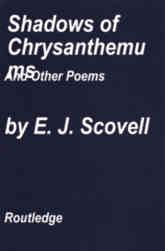Reilly 294.
Scovell, Edith Joy (1907–1999), poet, was born at Sheffield on 9 April 1907, the daughter of Canon Frederick George Scovell (1870–c.1951), vicar of St Andrew's Church, Sharrow, Sheffield, and his wife, Edith Anne, née Holl (c.1875–c.1964). She had seven brothers and sisters, and remained in close touch with them all her life, though she did not continue as a member of the Anglican—or any—church. She was a boarder at Casterton School in Westmorland (where the Brontës had been pupils), and went from there in 1928 as a scholar to Somerville College, Oxford, where she read first classical moderations and then English. She did not do well in her finals, but edited the Somerville literary paper The Fritillary, and contributed poems to university periodicals and to Basil Blackwell's annual anthologies.
Joy Scovell then maintained herself as a secretary in London (while writing poetry and publishing occasionally in periodicals) until on 1 December 1937 she married Charles Sutherland Elton (1900–1991), reader in ecology at the University of Oxford. They set up house in Oxford, first in a flat in Banbury Road, and then at 61 Park Town, a pleasant crescent with a central garden for the residents, which Charles and Joy helped to tend. They had two children.
Joy Scovell's first collection of poems, Shadows of Chrysanthemums, was published by Routledge during the Second World War (1944), and attracted praise from fellow poets Stephen Spender and, notably, Geoffrey Grigson, who singled her out as ‘the purest of our women poets’. Her next book, A Midsummer Meadow, followed after only two years, and then came The River Steamer in 1956, but after that she published no collection for a quarter of a century, chiefly because of a fear, as she put it, ‘of writing a fake mystical poem’, covering territory of the imagination which she had already explored. Learning to read Italian and visiting Italy gave her a new poetic experience during this time, and she translated some of the poems of Giovanni Pascoli, publishing them in Michael Schmidt's Poetry Nation Review. Other sources of inspiration for her later poetry were the birth of her grandchildren, her visit to her daughter in Montserrat, and her work as field assistant to her husband in the rain forests of Central and South America.
...Joy Scovell died on 19 October 1999 at St Luke's Home, Oxford. She was cremated in Oxford on 30 October.
Anne Ridler, Oxford Dictionary of National Biography
